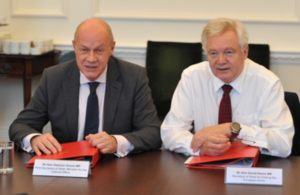Progress made at EU talks with devolved governments
Agreement has been reached between the UK Government and the devolved administrations on the principles that will underpin the process for bringing back powers from the EU to the UK.

First Secretary of State Damian Green MP and Rt Hon David Davis MP
The agreement came at a Joint Ministerial Committee (EN) in London today chaired by the First Secretary of State Damian Green MP with the Scottish and Welsh Governments. A representative from the Northern Ireland civil service also attended.
The First Secretary of State Damian Green said:
Following a set of constructive discussions with the Scottish and Welsh Governments, we have today agreed a set of principles that will underpin the process of repatriating EU powers.
On the day when the UK leaves the EU, all parts of the UK need to be ready. It is the government’s intention that the EU Withdrawal Bill will ensure a strong UK internal market, while safeguarding and adding to the decision-making powers of the devolved administrations.
These principles will hopefully now pave the way to agreeing a set of frameworks that will deliver vital certainty and continuity for people and businesses across the United Kingdom.
Background notes
Below is the Communique agreed at the Joint Ministerial Committee:
Joint Ministerial Committee (EU Negotiations) Communique
16 October 2017
The fifth Joint Ministerial Committee (EU Negotiations) met today in 70 Whitehall. The meeting was chaired by the Rt Hon Damian Green MP, First Secretary of State and Minister for the Cabinet Office.
The attending Ministers were:
From the UK Government: the First Secretary of State and Minister for the Cabinet Office, Rt Hon Damian Green MP; the Secretary of State for Exiting the EU, Rt Hon David Davis MP; the Secretary of State for Wales, Rt Hon Alun Cairns MP; the Secretary of State for Scotland, Rt Hon David Mundell MP; and, Parliamentary Under Secretary of State for Northern Ireland, Lord Bourne of Aberystwyth.
From the Welsh Government: Cabinet Secretary for Finance and Local Government, Mark Drakeford AM.
From the Scottish Government: the Minister for UK Negotiations on Scotland’s Place in Europe, Michael Russell MSP.
In the absence of Ministers from the Northern Ireland Executive, a senior civil servant from the Northern Ireland Civil Service was in attendance.
The Chair opened the meeting by summarising the bilateral engagement and political developments that had taken place since JMC (EN) last met. The Secretary of State for Exiting the EU provided an update on the previous rounds of negotiations with the EU and the Committee discussed forthcoming priorities and the future relationship with the EU. The Committee discussed the establishment of common frameworks.
Ministers noted the positive progress being made on consideration of common frameworks and agreed the principles that will underpin that work.
Common Frameworks: Definition and Principles
Definition
As the UK leaves the European Union, the Government of the United Kingdom and the devolved administrations agree to work together to establish common approaches in some areas that are currently governed by EU law, but that are otherwise within areas of competence of the devolved administrations or legislatures. A framework will set out a common UK, or GB, approach and how it will be operated and governed. This may consist of common goals, minimum or maximum standards, harmonisation, limits on action, or mutual recognition, depending on the policy area and the objectives being pursued. Frameworks may be implemented by legislation, by executive action, by memorandums of understanding, or by other means depending on the context in which the framework is intended to operate.
Context
The following principles apply to common frameworks in areas where EU law currently intersects with devolved competence. There will also be close working between the UK Government and the devolved administrations on reserved and excepted matters that impact significantly on devolved responsibilities.
Discussions will be either multilateral or bilateral between the UK Government and the devolved administrations. It will be the aim of all parties to agree where there is a need for common frameworks and the content of them.
The outcomes from these discussions on common frameworks will be without prejudice to the UK’s negotiations and future relationship with the EU.
Principles
Common frameworks will be established where they are necessary in order to:
- enable the functioning of the UK internal market, while acknowledging policy divergence;
- ensure compliance with international obligations;
- ensure the UK can negotiate, enter into and implement new trade agreements and international treaties;
- enable the management of common resources;
- administer and provide access to justice in cases with a cross-border element;
- safeguard the security of the UK.
Frameworks will respect the devolution settlements and the democratic accountability of the devolved legislatures, and will therefore:
- be based on established conventions and practices, including that the competence of the devolved institutions will not normally be adjusted without their consent;
- maintain, as a minimum, equivalent flexibility for tailoring policies to the specific needs of each territory as is afforded by current EU rules;
- lead to a significant increase in decision-making powers for the devolved administrations.